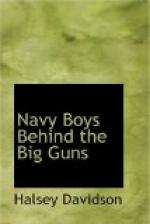CHAPTER XVIII
MORE TROUBLE
Philip Morgan and Al Torrance both were in the yawl, and were assigned to pull oars if the engine went dead from any cause. The two younger Seacove boys were taken by the warrant officer, Mr. Mudge, aboard the buoyant raft.
“Well, old man,” muttered Torry in his mate’s ear, “this is a new experience. We’ve never been shipwrecked before.”
Ikey on the raft was bewailing the loss of some of his duffle. “Oi, oi! And a nice new black silk neckerchief, too! Oi, oi! All for the fishes yet.”
Mr. MacMasters laughed, and did not order the boys to cease talking as a sterner officer might have done.
“We may as well take it cheerfully,” he said. “I’m thankful there’s nobody lost. And there can be no blame attached to any of us because of the loss of the boat.”
“Ah, that’s all right,” grumbled the warrant officer on the raft. “But think of those miserable Huns, sneaking away in here and dropping a mine in a channel where nothing but small craft dare sail.”
“Excursion steamers from Charleston use this channel,” Mr. MacMasters said. “I know it to be a fact.”
“Ah! That’s the Hun of it,” repeated the second. “To sink a craft having aboard a lot of innocent and helpless folk out on a pleasure excursion would be just his delight.”
First of all the two officers had looked over their charts and decided on the course to pursue. Charleston was not the nearest port.
The barometer was falling again and there was every promise of more bad weather. It was decided to make for a small town behind the islands, and instead of continuing through the channel where the Kennebunk’s auxiliary steamer had been mined, it seemed better to take advantage of the tide and run back to the open sea.
There they proposed to skirt along the outer beaches of the islands until they reached another passage marked on the charts as being the entrance to the sheltered harbor of the port in question. The distance was about ten miles.
There was no danger from reefs in this direction, and if they had to beach the boat and the raft the shores of the islands would seem to offer safe landings. They were yet to learn different.
Yet the decision was wise as far as the two officers could be expected to know without a special knowledge of the conditions. What mainly they failed to apprehend was the swiftness with which the new storm was approaching.
The little yawl chugged away cheerfully and drew the life raft out of the channel. No other craft had been in sight when the Kennebunk’s auxiliary steamer was blown up, and therefore none had come to their assistance.
The local fishermen and navigators of small craft appreciated the coming of this second storm on the heels of the first. It would probably pounce upon the coast with suddenness, so the fishing boats had already run for cover.




